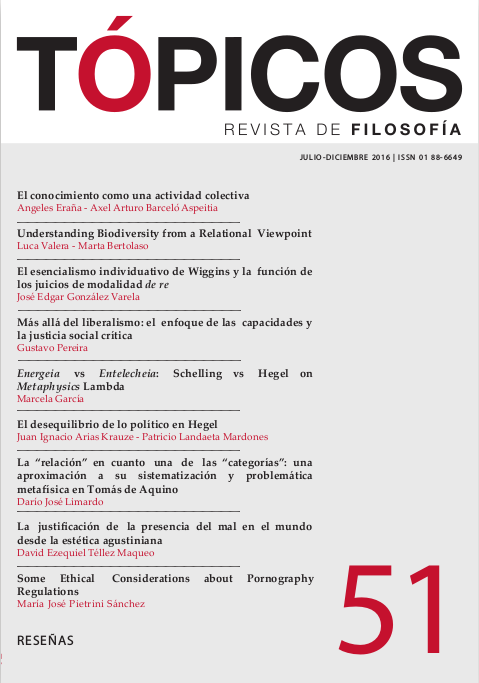Publicado 2016-07-01
Palabras clave
- Wiggins,
- Quine,
- escepticismo,
- juicios de modalidad de re
Cómo citar
Resumen
Quine ha promovido una forma de escepticismo sobre los juicios de modalidad de re que cuestiona su función (práctica y teórica) y sugiere, en consecuencia, su eliminación. Wiggins, por su parte, ha argumentado que nuestros juicios ordinarios de individuación de objetos nos comprometen con un cierto esencialismo, con la aceptación de ciertos juicios de modalidad de re. Si Wiggins tuviera razón, tendríamos una respuesta potencial al escepticismo quineano de la función. Sin embargo, en este trabajo argumento que la propuesta de Wiggins es incapaz de proporcionar una respuesta satisfactoria al escepticismo quineano, pues presupone aquello mismo que está en cuestión: los compromisos esencialistas se siguen sólo de la adopción previa de otros juicios de modalidad de re cuya función está precisamente en entredicho. Asimismo, argumento que esta misma conclusión puede extraerse de la consideración de algunas otras teorías contemporáneas de la individuación, similares a la de Wiggins.
Referencias
- Ayer, A. J., (1936). Language, Truth and Logic. Londres: Victor Gollancz.
- Brody, B. (1980). Identity and Essence. Princeton NJ: Princeton University Press.
- Carnap, R. (1956). Meaning and Necessity. 2da. ed. Chicago: University of Chicago Press. Chalmers, D., Wasserman, R. y Manley, D. (eds. (2009). Metametaphysics: New Essays on the Foundations of Ontology. Oxford: OUP.
- Divers, J. (2007). Quinean Scepticism about De re Modality after David Lewis. European Journal of Philosophy, 15, 40–62. <http://onlinelibrary.wiley.com/doi/10.1111/j.1468-0378.2007.00229.x/abstract>
- Fine, K. (1978). Model Theory for Modal Logic Part I: the De re/De dicto Distinction. Journal of Philosophical Logic, 7, 125-56. http://link.springer.com/article/10.1007%2FBF00245925
- Grice, P. y Strawson, P. F. (1956). ‘In Defense of a Dogma’. Philosophical Review, 65, 141-58. <http://www.jstor.org/ stable/2182828?origin=crossref&seq=1#page_scan_tab_contents>
- Hookway, C. (1988). Quine. Cambridge: Polity Press.
- Hylton, P. (2007). Quine. Londres: Routledge.
- Kripke, S. (1980). Naming and Necessity. Cambridge MA: Harvard University Press. Lewis, D. Causation. Journal of Philosophy, 70, 556–67.
- _____ (1986). On the Plurality of Worlds. Oxford: Blackwell.
- Lowe, E. J. (2003). ‘Individuation’. En The Oxford Handbook of Metaphysics. M. Loux y D. Zimmerman (Eds.) (75-95). Oxford: OUP.
- _____ (2009). More Kinds of Being: A Further Study of Individuation. Identity and the Logic of Sortal Terms. Oxford: Wiley-Blackwell.
- Mackie, Penelope. (2006). How Things Might Have Been: Individuals, Kinds and Essential Properties. Oxford: Clarendon Press.
- Quine, W. V., (1951). Two Dogmas of Empiricism. Philosophical Review, 60, 20-43. Reimpreso en W. Quine (1961). From a Logical Point of View. 2da. ed. (20-46). Cambridge MA: Harvard University Press.
- ____ (1953a) Three Grades of Modal Involvement. Proceedings of the XIth International Congress of Philosophy, vol. 14, Amsterdam, North-Holland. Reimpreso en Quine (1976). The Ways of Paradox. ed. rev. (158-76) Cambridge MA: Harvard University Press.
- ____ (1953b) Reference and Modality. En From a Logical Point of View. 1a ed. Cambridge MA: Harvard University Press. Reimpreso en Quine. (1961). From a Logical Point of View. 2da. ed. (139-59).
- ____ (1969) Replies. En Words and Objections: Essays on the Work of W. V. Quine. D. Davidson y J. Hintikka (Eds.) Dordrecht: D. Reidel.
- Sidelle, A. (1989). Necessity, Essence and Individuation: A Defense of Conventionalism. Ithaca: Cornell University Press.
- Thomasson, A. L. (2007). Ordinary Objects. Oxford: OUP.
- _____ (2015). Ontology Made Easy. Oxford: OUP.
- Wiggins, D. (1980). Sameness and Substance. Oxford: Basil Blackwell.
- ____ (2001). Sameness and Substance Renewed. Cambridge: Cambridge University Press.






